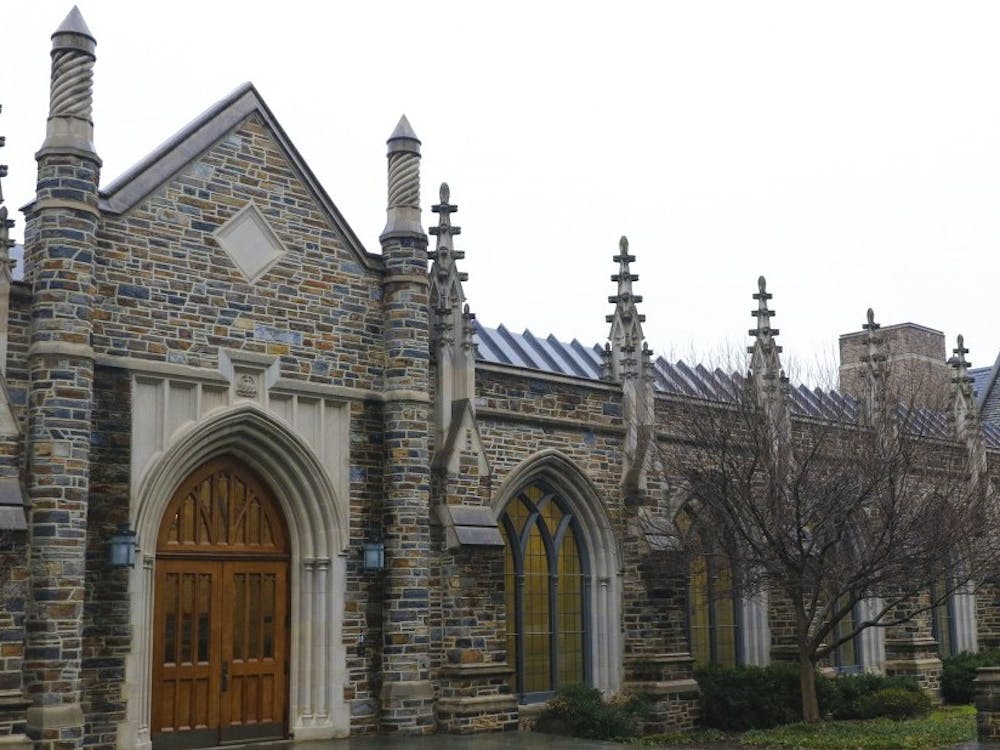As controversy surrounds the United Methodist Church’s stance on LGBTQ+ rights, some students argue that Duke Divinity School has struggled to support its own LGBTQ+ students.
In February 2019, the UMC voted at its general conference to uphold and strengthen its ban on the ordination and marriage of LGBTQ+ people. In May 2020, at another General Conference meeting, the Church will debate a potential breakup in the UMC between the congregations that support full inclusion of LGBTQ+ people and those that do not.
The day the February vote was announced, Divinity School Dean L. Gregory Jones released a statement emphasizing that although the Divinity School receives significant funding from the church, it seeks to create an environment where students and faculty are permitted to have differing views on sexuality.
“I know I speak for many in grieving the deep wounds to the United Methodist Church,” Jones wrote in the statement.
Third-year Master of Divinity student Madeline Reyes, who identifies as queer and bisexual, said she felt that the statement “was very vague,” which was “very hurtful to a lot of people.”
Reyes is a member of Divinity Pride—the Divinity School’s LGBTQ+ student group formerly known as Sacred Worth. She identifies with the United Church of Christ and is also a practicing Jew.
The statement “notably did not actually name LGBTQIA+ issues at all,” Reyes said. She argued that this was disrespectful to LGBTQ+ Methodist students who suddenly had to reconsider their life plans if they had been seeking ordination in the Methodist Church.
Jones wrote in an email to The Chronicle that the statement was meant to “interpret the broader context” of the UMC decision, and that he emailed a second statement to students and faculty the next day that “explicitly mention[ed] our concern for LGBTQIA+ students.”
“We acknowledge the particular pain that the LGBTQ+ community is experiencing as a result of the last few days, both here at Duke Divinity School and around the world,” Jones wrote in the second statement. “This includes especially United Methodists, but is not limited to our denomination. We value and honor your presence, witness, and calling in our community.”
Jones’ email asked that staff and faculty members “be prepared to engage with students” about the controversial decision in supportive ways. The statement also reminded readers that the Divinity School exists “to prepare students for a variety of forms of Christian ministry,” not just for Methodist ordination.
Lastly, Jones condemned “hateful rhetoric” and expressed the hope that people in the Divinity School would try to “be hospitable and charitable to one another” in trying times.
Michael Vazquez, a second-year Master of Theological Studies student at the Divinity School and co-president of Divinity Pride, agreed with Reyes. He said that the statement reflected “a general lack of care and concern for LGBTQ+ students at the Divinity School in light of the decision.”
“If you’re choosing to remain in a posture of neutrality, you are in effect saying ‘Your lives are insignificant to us, or at least not significant enough for us to make a statement in full support of your right to exist,’” Vazquez said.
He argued that the administration attempted to remain neutral on the UMC vote, but said that many faculty members did not. Although some professors were very supportive and gave students valuable time and space to reflect, he heard reports of several faculty members who “downplayed it or made jokes about the whole process and about the impact, trying to make it seem as if it wasn’t a significant event.”
Aside from the statements, the Divinity School hosted an event called “A Time of Solidarity and Support for LGBTQIA+ Students at Duke Divinity,” which included a prayer, a platform for LGBTQ+ students to speak and a pizza lunch.
Jones wrote that in addition to that event and his two statements, the “Methodist House hosted several events in March and April, and we hosted a number of other gatherings.”
However, Reyes says that the usual process is that LGBTQ+ students in the Divinity School have to navigate their discussions and reflections on their own.
“We really just have to build community and then talk to people,” she said.
Divinity Pride has a mailing list of around 70 students, Vazquez said, and it “exists to create a space for queer students at the Divinity School to engage in theological discussion about sexuality, navigating primarily queer students’ own experiences.” The group also provides space for discussion and collaboration with non-queer students who identify as allies.
Many Divinity Pride students, including Reyes, were among those who interrupted former Dean Elaine Heath’s State of the School address in Spring 2018 to present a list of 15 demands, measures they felt the Divinity School needed to take in support of its LGBTQ+ population.
Reyes said that many of the demands LGBTQ+ students made at their protest in 2018 were met, including requests for a queer theology class and gender-neutral signage for the bathrooms. However, not everyone was satisfied.
“A lot of the more impactful demands, specifically those that required funding, like queer-specific scholarship support, have not been met,” she said.
Both Reyes and Vazquez noted that, other than a professor who traveled to the school just to teach the queer theology class, the Divinity School has no out LGBTQ+ faculty.
In fact, the Divinity School’s website lists faculty experts by topic, and only two are listed under “LGBTQ+ rights.” One of those faculty members is Mary Fulkerson, a Presbyterian clergywoman who retired last year as the second-longest serving member of Divinity School faculty. Fulkerson told The Chronicle that although she is a strong believer in LGBTQ+ rights and has worked closely with LGBTQ+ students in the school, she is “no expert on this topic.”
For several years, she taught a course called Sexuality: Bible, Church, and Controversy. The course brought in experts for almost every class to cover topics including biblical perspectives on sexuality, the presentation of sexuality in Christian history, scientific and psychiatric perspectives on sexuality, and best practices for inclusive preaching.
“Even though the title is not explicit, it’s really a pro-LGBTQ+ course,” Fulkerson said.
She explained that she hopes that as young people continue to replace some of the older, more conservative members of the Church, “the openness to changing denominational policies and the passion for treating all human beings as created in the image of God will be expanding.”
Vazquez said that academic administrators “lean toward more general support, but if we’re talking about the dean’s office, the more behind-the-scenes administrators who also tend to have more control over finances and decision-making at the school, [they] tend to be less supportive.”
Jones wrote in an email to The Chronicle that he was “saddened” to hear this perspective. The dean’s office has provided funding for various projects and “significant scholarship support for LGBTQIA+ students” in its attempt to “create a welcoming context for all of our students,” Jones wrote.
Both Fulkerson and Vazquez noted that one reason for the Divinity School administration’s perceived lack of explicit support for LGBTQ+ students may be that the school’s existence is made possible by funding from the United Methodist Church.
In fact, Jones wrote that the UMC’s decision to strengthen its rules has already “negatively affected our financial support, as the turmoil in the denomination has resulted in fewer offering plate dollars in the USA, and that in turn reduces the funding we receive.”
Another plan, known as the UMCNext Proposal, keeps the main body of UMC congregations unified, but allows churches to leave without losing all UMC support and connections. This plan also makes anti-LGBTQ+ language less explicit and eliminates disciplinary processes for people who have violated the rules in the past.
Jones explained that it is too early to predict what will happen in the Church, but he explained that a link between the school and UMC would persist.
“If there is some kind of split in the current UMC, Duke Divinity School will likely remain connected both to the UMC and to a variety of the Wesleyan communities that emerge out of the 2020 General Conference and subsequent deliberations and decisions,” he wrote.
Kristi Sturgill contributed reporting.
Get The Chronicle straight to your inbox
Signup for our weekly newsletter. Cancel at any time.

Anna Zolotor is a Trinity senior and recruitment chair for The Chronicle's 118th volume. She was previously news editor for Volume 117.

